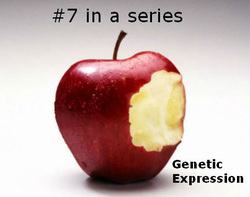
I'm talking about genetics. Back then, I just gave in to the seemingly scientific fact that we all are predestined to doom or delight when it comes to our health, depending on the genetic hand that was dealt to us. But with new research now after over 50 years since Francis Watson and James Crick first proposed their model for DNA and genetics, we can take this matter of doom or delight into our own hands when it comes to our health. I know, I know, I hear you say, "well, we all still die, 10 out of 10 people die." Yes, you are right. We will never defeat death in this perishable body on this earth, but while we are here, we can sure put up a good fight, and we can possibly save ourselves from living out our days on a bed of ill health. I believe our bodies are God's temple where the Holy Spirit dwells, and we need to care for it as much as we can.
Now don't go slap your mother. I'm about to tell you about new research that points to the fact that our genetic tendencies are not set in stone, that they can be influenced by the choices we make. It's really hard for me to believe that we can alter our propensity toward a certain disease by the foods we eat, but that's what new research is trying to say.
Take a look at these two words and the meanings given to them:
Nature: The inner blueprint that has its own rules and regulations
Nurture: Everything you do, like eating, sleeping, working, exercising, learning, environmental exposure (the sum total of it all).
It's not an all or nothing kind of thing, it's not all nature or all nurture when it comes to our health or lack of.
What would be the first thing you would think of if given the word from your doctor that you have heart disease or cancer? Your first thought would probably be that of wondering if this is something that is genetic, that you couldn't possibly have done anything about it (nature), or is it caused by the way you are doing things (nurture).
New research is indicating that what we inherit (nature) is only a genetic potential or tendency, but how we live and the quality of our environment (nurture) determines what our genes actually express. For instance, you may inherit a tendency for heart disease or cancer, but these diseases may only be expressed depending on how you live, eat, and the toxins you may be exposed to. You may never develop that heart disease or cancer if you don't smoke, and you do exercise, eat right and avoid toxins as much as you can.
Now isn't that good news! You don't have to slap your mother, and she doesn't have to slap her mother, but both of you can work on nurturing your body for the sake of good health. To get you started, I have listed a few simple steps to work on:
1. Avoid as many contaminants as you can: pesticides (go organic if possible), heavy metals (cook in stainless steel, cast iron (see comments below about cast iron), glass, or porcelain cookware instead of aluminum), plastic packaging (especially in the microwave), cosmetics or anything you are putting on your skin that contains toxins. The skin is our largest organ and can definitely absorb chemicals we put on it.
2. Avoid as many processed foods and sugar as possible: Think about what kinds of foods the Pilgrims must have eaten when they landed here in America and try to avoid foods that they would not recognize. Would they have eaten Twinkies, Fruit Loops Cereal, Ramen Noodles, Hamburger Helper? No, but they would eat whole foods like vegetables and fruits, wild game, or sea foods.
3. Stay hydrated by drinking plenty of filtered water, broths, soups, and herbal tea
4. Get plenty of sleep
5. Exercise regularly but do not overdo it.
6. Eat a diverse array of foods with many colors. Learn what factors influence the nutrients in our foods.
May God bless your efforts to be healthy.
Reference:
Mateljan, George. (2007). The World's Healthiest Foods. (1st Edition). Canada: GMF Publishing

